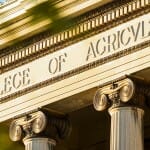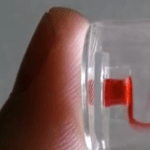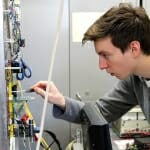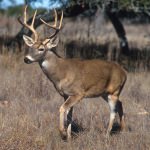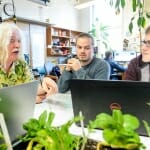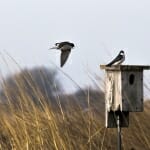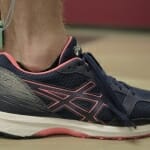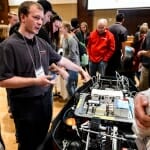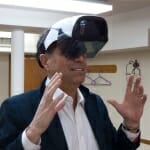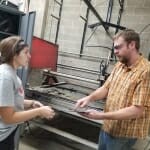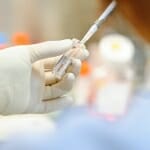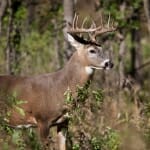Category Science & Technology
Study shows yogurt may dampen chronic inflammation linked to multiple diseases
New UW–Madison research indicates that ongoing consumption of yogurt may have a general anti-inflammatory effect.
UW-Madison biomanufacturer offers essential gene-transfer capacity
A UW–Madison lab that makes proteins, antibodies and viruses has begun manufacturing a virus critical to experimental treatments for many genetic conditions.
Liquid crystals self-regulate the release of drugs in precise, repeating doses with simple nudge from their environment
Researchers at the University of Wisconsin–Madison have developed liquid crystal films and droplets that can hold a wide range of “micro-cargo” until their release is cued by body heat or a beam of light or even the wake of swimming microorganisms.
For scientist studying turbulence, the sky is the limit
Michael Graham, a professor of chemical and biological engineering, is a leader in the field, and a recently awarded Department of Defense Vannevar Bush Faculty Fellowship is enabling his potentially transformative research on turbulence.
Prototype camera set for integration into novel gamma-ray telescope
A unique high-speed camera, designed to capture the fleeting effects of gamma rays crashing into the Earth’s atmosphere, will soon be on its way from the University of Wisconsin–Madison to Arizona’s Mount Hopkins.
CWD prions discovered in soil near Wisconsin mineral licks for the first time
New research out of the UW–Madison has, for the first time, detected prions responsible for chronic wasting disease (CWD) in samples taken from sites where deer congregate.
‘Origins’ scientists to take your questions Thursday during Reddit AMA
Ever wondered what it’s like to unearth a long-buried human ancestor? Or to peer into the night sky to discover the mysteries of galaxy evolution? Find out Thursday.
Bird observing course an experience in finding passion for nature
In the Birds of Southern Wisconsin course, students must sometimes brave the elements to collect observations of Wisconsin’s overwintering and migratory birds.
In ‘Origins,’ UW–Madison and South African scientists tackle mysteries of our shared beginnings
The quest to understand our beginnings — of our universe, of life on Earth, of our species — inspires people all over the world. At UW–Madison, researchers have forged partnerships with colleagues in South Africa and are uncovering answers and opening new scientific frontiers.
Newest Badgerloop Pod unveiled
The UW–Madison Badgerloop team Thursday revealed Badgerloop Pod III — its latest entry into the 2018 SpaceX Hyperloop Competition, an event designed to spur new ideas about an ultrafast, futuristic form of transportation.
Curious Madisonian still innovating, designing, improving 35 years after UW–Madison graduation
Bruce Winkler has invented, designed or facilitated an amazing range of devices since he earned his bachelor’s degree in mechanical engineering from UW–Madison in 1983.
Driverless shuttle to deliver rides at UW–Madison April 24–25
Members of the public can ride in an Autonom Shuttle from 9 a.m. to 3 p.m. both days. The College of Engineering is home to the Wisconsin Automated Vehicle Proving Grounds.
Women’s Shop Night a hit in Biological Systems Engineering
The Biological Systems Engineering department created a bi-weekly Women’s Shop Night to encourage more women to get hands-on experience in design and fabrication, and it's been a big success.
Stem cell symposium to highlight clinical trials, safety and regulation
Speakers at the annual Wisconsin Stem Cell Symposium will discuss clinical trials involving stem cells, safety considerations and the regulatory environment under which ongoing stem cell work takes place.
Two UW–Madison students named Goldwater Scholars; two receive honorable mentions
The Goldwater Scholarship is considered the most prestigious undergraduate scholarship in the natural sciences, mathematics and engineering in America.
Line-skipping business takes top honors at UW–Madison innovation competition
Selected from among 35 student teams and student-led start-up companies, LineLeap received the $15,000 Qualcomm grand prize in the 2018 Transcend Madison Innovation Competition.

